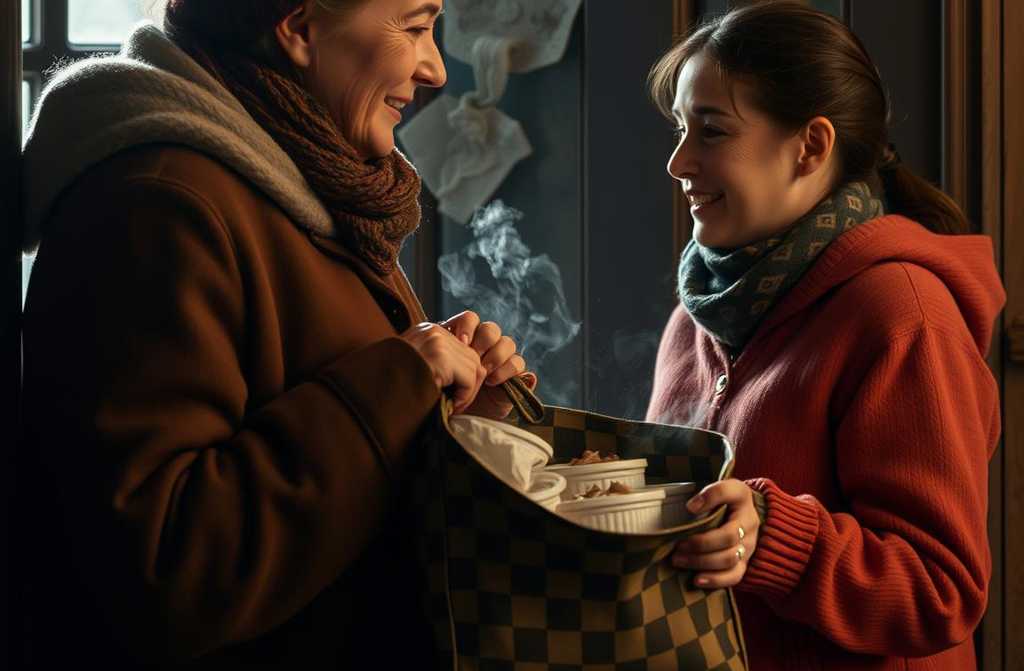Three Mornings a Week…
My mother was a woman of quiet strength and boundless kindness. I grew up in an ordinary familyMum worked as a nursery assistant, Dad drove lorries. We lived simply, but the word “want” never weighed heavy, for it was always softened by Mums care and the warmth of home.
One evening, Dad never came back. On the bus home, he fell ill, losing consciousness. People assumed he was drunkthe driver and conductor carried him off at the terminus and left him beneath a tree. Only at shifts end did they call an ambulance. Doctors marvelled that he survived at all. He never truly recovered after thathis heart seemed to tread more carefully, as if on tiptoe. But Mum only thanked heaven:
“Praise God, hes alive. Thats all that matters.”
She always spoke like that. “If you lose something, it means God took the thing, not your health.” Her plain words settled in my soul like a freshly ironed linen cloth laid upon the table.
When I left for university in London, our little miracle beganthree mornings a week. The coach departed at six. Mum rose before dawn. The kitchen glowed under the lamplight, the kettle murmured, and the cold outside rang sharp in the air. She arranged her quiet arithmetic of love upon the table: porridge in a tin, minced pies in an enamel dish, salad in a jar with a new lid, cordial in a bottle, a couple of pastries “for later,” an apple, and salt in a twist of paper”just in case.” She bundled it all in a clean tea towel”to keep the warmth in”and packed it into that same blue-checked bag, where the little jars chimed like tiny bells.
“Mum, you neednt…” Id say over the phone the night before. “Ill manage.”
“And so shall I,” shed laugh. “Better my hands grow weary than your heart ache with homesickness.”
At six, the coach sighed and rolled away. Two hours later, my buzzer would sound:
“Love, open upIm at your door.”
And wed breakfast together. Id shut my eyes in pleasure, just as I had as a child. Then, for the day aheadcontainers, jars, “this for tomorrow,” “this for when youre in a rush,” “and this, in case your friend drops by.” Three times a week, without fail. If ever she didnt come, Id sulk as though shed stolen a breath of air from me.
“You promised…” Id whisper into the receiver.
“Forgive me, darling. The bus broke down today. Ill come tomorrow.”
I married in haste. My parents werent at the wedding.
“But what about your father?” Mum asked softly. “He cant travel so far.”
“Then well visit you afterward and celebrate together,” I said briskly, changing the subject. Only years later did I understandshe had wanted to be there. To see me in my wedding dress not through photographs, but with her own eyes.
Dad went first. Mum grew quiet, like a house with no lamp lit at dusk. I could only muster hollow comfort:
“Mum, dont grieve so… He was ill so long. It wouldve happened regardless.”
She noddedand came even more often, now bearing not just my favourite pies, but tiny jars of mashed peas “for the little ones.”
“Mum, wheres the water from?” Id ask.
“The well. The sweetest kind. I boiled it.”
One evening, my husband said:
“We wont eat this. Who knows where its from, or how clean it is. Certainly not the children.”
“But its Mum…”
“Exactly. Dont upset herjust say thank you and leave it at that.”
I didnt “leave it.” I smiled, took the bag, and later… threw it away. Gently, so the jars wouldnt clink. Returned the empty dishes”Mum, it was lovely”and heard her bright reply:
“Thank heaven you enjoyed it. Next time Ill try it different, might be even better.”
She never scolded me. She came, brought her bags of food, sat at the table, and listened. And II complained: work was hard, the children unruly, the house a burden, exhaustion piled upon exhaustion.
“We cant even get away,” I sighed. “Not even a weekend for just the two of ustheres no one to mind the children.”
Mum lifted her eyes and said gently:
“No one? What about me? Id stay with them.”
I laughed as though it were a joke:
“Mum, really! We can barely manage them ourselveshow could you? What could you possibly do?…”
She fell silent. Just smiled her quiet, almost childlike smile. And, as always, turned the subject:
“Well, never mind. The important thing is youre together. Ill make some soupease your load a little.”
And then she was gone.
Silence. No one came with treats. Only emptiness where her love had been. I wept, and in my ears rang my own voicecold, alien: “Dont grieve so, it wouldve happened anyway.” My husband and children echoed:
“Why torment yourself? She was elderly…”
But I couldnt rest.
I went to her house. The kitchen was spotless, sterile as a surgery. A lace cloth without a stain. On the stoolthe folded tea towel, that same one. In the pailfresh water, drawn by her hands. In the bedroomthe neatly made bed, a Bible with warm, yellowed corners at the pillow, her spectacles, notepad, pen, handkerchief. I touched the handkerchiefand it was like touching her palm.
I sat on the beds edge and spoke to the emptiness as though she stood in the doorway with her bag:
“Mum, forgive me. For not having you at my wedding. For not seeing your care. For throwing away your food. For doubting you could mind my children. For well see each other plenty. For all I didnt eat, didnt hear, didnt say…”
And thenI thought I heard it. The soft hiss of the kettle from the kitchen. And her voice, clear as ever:
“Darling, hush now. Dont weep. The important thing is youre alive. The children, too. I always knew. Ive always seen how you love.”
Love can indeed be carried in a blue-checked bag. Wrapped in a tea towel to keep it from spilling. Brought at six in the morning, three times a weekwithout a single complaint. It can be received… or it can be overlooked.
Now, when I make porridge, I lay a clean towel on the table. I set out an empty platefor her pies thatll never come. And I whisper:
“Mum, I love you. So much. And I miss you beyond bearing.”
And I knowwherever she is now, shes warm. For she spent her life warming us. And with God, no food is ever wasted. Only carefully, lovingly wrapped portions of memory.







